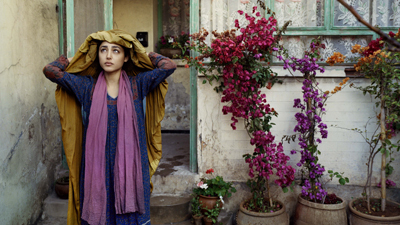By: debbie lynn elias

Not only an emotionally immersive cultural experience, THE PATIENCE STONE packs an elegant emotional punch that just assails you like a bullet to the neck. Writer/director Atiq Rahimi together with co-writer Jean-Claude Carriere, adapt Rahimi’s best-selling novel of the same name with such poetic allegory as to make one’s heart stop.
Pulling back the curtain on Muslim women in a patriarchal society, we are thrust into a war torn country in the Middle East. An arranged marriage between a beautiful young woman and much older man. A husband who is shot in the neck in battle, leaving him paralyzed and comatose, is dumped at his home by his comrades for his beautiful young wife to care for. With the battle front moving to their small town and a husband unable to be moved, The Woman takes her small children to her aunt’s home in Riyadh while she dutifully tends to her dying husband. But in the quiet, she is finally able to speak to him, bearing her soul and her secrets as he becomes her “Patience Stone.”
Starring Iranian actress Golshifteh Farahani as The Woman, Farahani mesmerizes. Her eyes speak volumes. Her fingers and hands as well. A simple turn of the head, a tear – everything has a meaning, yet done with an effortlessness that belies calculated theater. She is poetry in motion. Outstanding performance comes from Massi Mrowat who, making his acting debut, delivers a purity of naivete and innocence as the Young Solder who seeks his own form of comfort and solace from The Woman.
An honest purity and simplicity to the parable of the Patience Stone that when translated to present day and a war torn world, serves as a great comfort and even rationale for the horrors of war and the burdens of certain cultures and religions, such as the Muslim and/or Afghan world. Telling this story on film through the eyes of a woman adds another layer of emotion and gravitas to the construct given how women are looked down upon in such cultures. The non-linear narrative storytelling keeps us on our toes, keeps us interested and as The Woman unburdens herself to THE PATIENCE STONE in bits and pieces, we draw ever deeper into her world and into the magic of the mythology and The Woman’s sensuality.
Hypnotic is Thierry Arbogast’s cinematography. Cinematic in presentation, Arbogast creates a theatrical intimacy with low camera angles, skewed angles or eyes pointing upward (which serve well Golshifteh Farahani’s performance as she is so often reaching upward, upward as if to heaven seeking answers.) Crisp and polished during intimate monologues, colors are bright with pops of purple and fuschia scene in brief exteriors and which gradually find their way into the filmic process as the story develops and the woman reveals more and more to her seemingly dead husband. Utilizing sunlight to its best advantage as shining through murky plastic or the dainty tatted pattern of curtains, the light softens like a dream, adding to the mystery and magic of the story of the Prophet. Through intense close-ups on the eyes – be it the woman, the husband or the young soldier with a kind heart – souls truly are revealed capturing real emotional truth and pain in the film, showcasing the performances. Resolution is so strong that we see the riddling of individual bullet holes or the chipped paint and plaster from shrapnel – akin to the war chipping away at life the way the woman is chipping away at THE PATIENCE STONE just waiting for it to break open into freedom.
There is a lightness to the lensing that provides a buoyancy to heavy subject matter. As light on her feet as the woman is, so is the camera. as she rises, the camera rises, as she slowly caresses the young soldier or her husband, the camera and the light softly caress and bathe her. Arbogast’s camera work allows us to become part of The Woman’s very essence, her most intimate thoughts.
THE PATIENCE STONE – Spellbinding soulful beauty that speaks through, and to, the heart.
Directed by Atiq Rahimi
Written by Jean-Claude Carriere and Rahimi based on Rahimi’s novel, THE PATIENCE STONE
Cast: Golshifteh Farahani, Hamid Djavadan, Massi Mrowat












